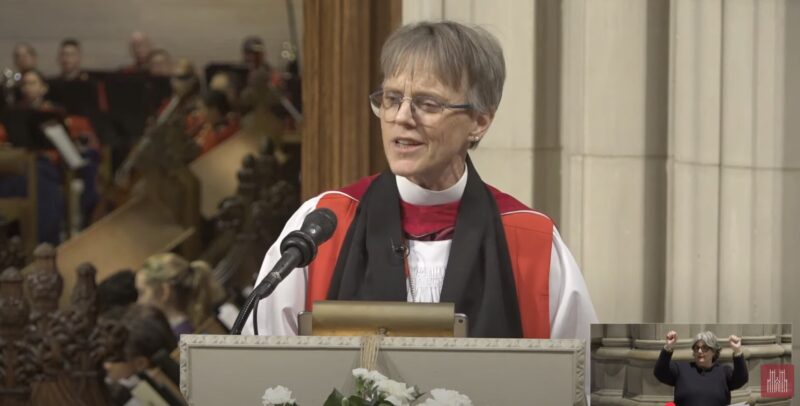In a striking act of moral courage, Bishop Mariann Edgar Budde of the Episcopal Diocese of Washington made it clear in a new interview with NPR that she would not apologize for her sermon urging President Trump to show mercy and compassion toward marginalized communities.
Speaking on All Things Considered, Budde stood firm in her conviction, saying, “I don’t feel there’s a need to apologize for a request for mercy.”
Budde’s remarks came after a sermon at the National Prayer Service, where she directly addressed Trump and Vice President J.D. Vance, urging the president to reconsider his divisive rhetoric and harmful policies.
Her sermon, delivered in front of a packed congregation at Washington’s National Cathedral, included a heartfelt plea for Trump to stop dehumanizing immigrants and transgender individuals, two groups targeted in his latest wave of executive orders.
“In the name of our God, I ask you to have mercy upon the people in our country who are scared now,” she said, turning her gaze toward Trump.
The backlash from Trump and his neofascist allies was swift and fierce. One Republican congressman even suggested Budde, who was born in the United States, should be “added to the deportation list.” Trump himself took to Truth Social, calling her a “Radical Left hardline Trump hater” who brought “her church into the World of politics in a very ungracious way.”
Despite the vitriol, Budde told NPR she had no regrets about speaking out. “I don’t hate the president, and I pray for him,” she said. “But no, I won’t apologize for what I said.”
While acknowledging that her sermon had provoked outrage, she argued that her words were necessary and rooted in a moral imperative to defend the vulnerable.
“I regret that it caused the kind of response that it has,” Budde said, “but it actually confirms what I was speaking of earlier—our tendency to jump to outrage and not speak to one another with respect.”
Budde’s sermon came just one day after Trump signed executive orders targeting the rights of transgender individuals and attempting to end birthright citizenship. These moves, widely condemned by human rights advocates, are part of Trump’s broader effort to energize his far-right base by attacking society’s most marginalized groups.
“There are gay, lesbian, and transgender children in Democratic, Republican, and independent families, some who fear for their lives,” Budde said in her sermon.
She also pointed out the contributions of poor, migrant workers, who work long hours in fields, hospitals, and restaurants, yet are often scapegoated as criminals.
“The vast majority of immigrants are not criminals,” she said. “They pay taxes and are good neighbors.”
For Budde, the sermon was not a political attack but a moral plea grounded in her faith. “To be united as a country with so many riches of diversity, we need mercy. We need compassion. We need empathy,” she told NPR.
Her refusal to apologize highlights the stark divide between her vision of a compassionate, inclusive society and the administration’s policies of exclusion and fear-mongering.
Budde’s stance has drawn both condemnation and praise, with critics accusing her of politicizing the pulpit and supporters hailing her as a voice of conscience in a time of moral crisis.
Whatever the reaction, Budde has made one thing clear: she will not back down from calling for justice and mercy, even in the face of political attacks.
“No, I won’t apologize for what I said,” she reiterated—a statement that underscores her unwavering commitment to standing up for the marginalized, even when it means challenging the most powerful man in the room.

